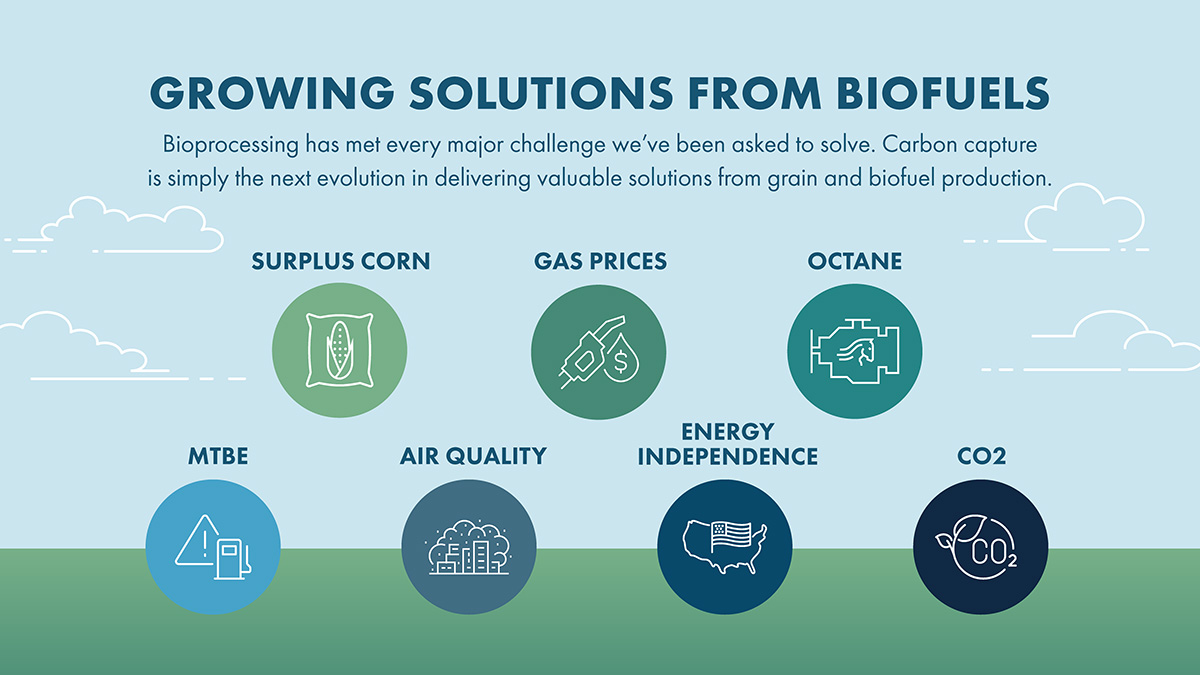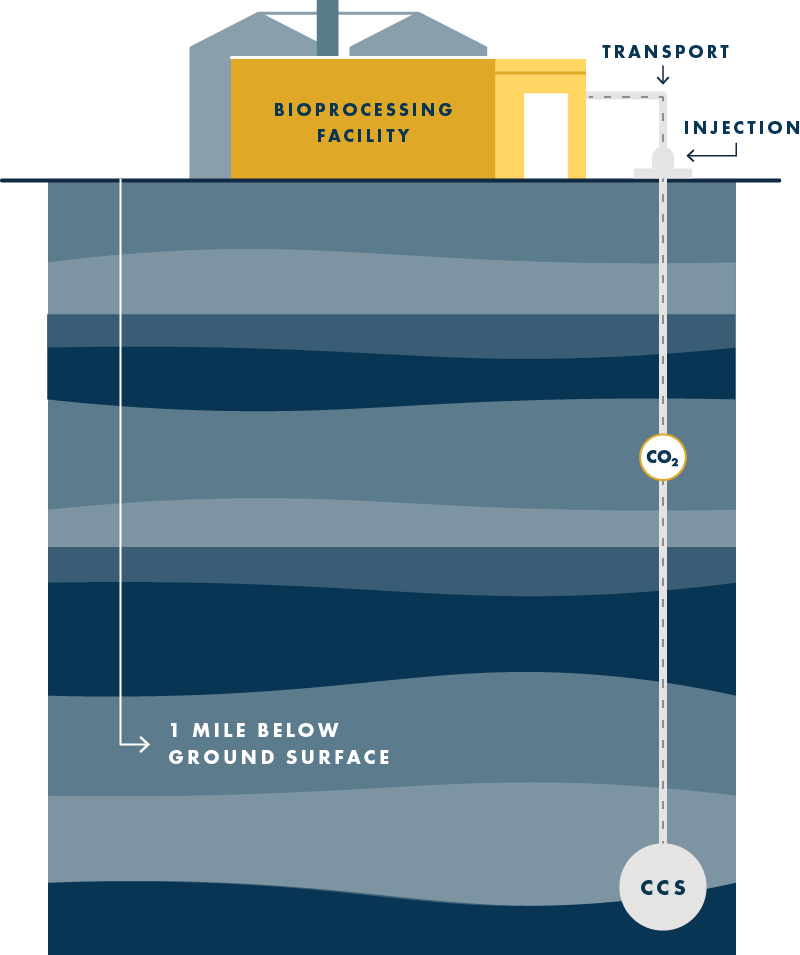
Carbon Capture
Extending POET's Partnership with Farmers
POET’s bioethanol production process creates value from every part of the corn kernel. The starch is fermented to produce bioethanol, while the remaining protein, oil, and micronutrients are used to produce a wide variety of bioproducts.
The same holds true when it comes to creating value from the CO2 stored in each kernel from the natural growing cycle of corn. Capturing the pure, biogenic CO2 from bioethanol production will not only help us decarbonize bioethanol, but it will also build the market for using CO2 in other applications.
Accelerating Growth in the Bioeconomy
- POET is one of the fastest-growing renewable CO2 companies in the United States.
- We supply a nationwide customer base with CO2 for a variety of applications, including beverage carbonation, food processing, municipal water treatment, fire suppression, and various industrial uses.
- Permanent underground carbon storage represents the next leap forward in how POET can utilize bioprocessing to accelerate our path to net zero.
- These technologies have the potential to meet the growing demand for low-carbon biofuels, add value to every bushel of corn and every acre of land, and ensure the prosperity of American agriculture for future generations.
Our Approach
As a company, POET remains committed to pursuing CO2 technologies that exceed the highest safety standards, respect the rights of landowners, and create value for local farmers and the communities we call home. We believe that states and counties that are slow to adopt these technologies risk being left behind.
Bioethanol has created solutions to every problem we’ve been asked to solve, from making America more energy independent, replacing MTBE, boosting octane, improving air quality — and now, removing CO2 from the atmosphere. Bioethanol has driven demand for corn and created value for farmers throughout its history, and CO2 is just the next step in its evolution.
“We believe carbon capture systems are an important piece of the carbon reduction puzzle. By creating new opportunities for biofuels, we believe this will bring long-term value back to the farm, ensuring that agriculture continues to play a key role in moving our world toward a more sustainable future.” – Jeff Broin, founder and CEO of POET

Learn More About CCUS
What is Carbon Capture, Utilization, and Storage (CCUS)?
CCUS is the separation and capture of CO2 from industrial processes and its reuse or storage. Through this process, CO2 that otherwise would go into the atmosphere can be sequestered in deep geological formations like sandstone and limestone. The CO2 occupies the small pore spaces in the formations deep below multiple layers of solid cap rock, where it remains safely underground for millions of years.
Why is CCUS important?
The safe and responsible use of carbon capture represents a consequential opportunity to transform rural economies and benefit farm families, much like the bioethanol industry has done over the past four decades.
Agriculture has benefitted significantly from the growth of biofuels. While the bioethanol industry scaled up from less than 1% of the nation’s gasoline supply to more than 10%, U.S. farm income nearly tripled. Land values more than doubled. As CO2 capture from bioethanol expands, so too will farm incomes, just as they did in the past.
Leveraging carbon capture to further decarbonize bioethanol fuels provides new market opportunities and adds value to every bushel of corn and every acre of land.
Benefits of CCUS:
Capturing value from CO2 will:
- Create new jobs and investments in local communities.
- Sustain economic growth and support hometown businesses.
- Increase the value of corn for local farmers.
- Keep agriculture thriving.

FAQ
The marketplace is demanding lower-carbon biofuels. POET must adapt to stay competitive, and capturing CO2 will help us do that.
POET started from a family farm, and for more than 35 years, we’ve been expanding markets for farmers and increasing the value of grain so families can continue to be successful. Creating value from CO2 is a way to add value to grain, extend our partnership with family farmers, and keep agriculture thriving.
During the fermentation of starch into bioethanol molecules, yeast naturally emits biogenic CO2 that is 99.9 percent pure. An average-sized bioprocessing facility can capture 99,000 to 153,000 tons of CO2 a year, and there is strong potential to expand carbon capture. After the CO2 is captured from our bioprocessing locations, compressed CO2 is transported through short pipelines to underground injection sites regulated by the Environmental Protection Agency (EPA) for permanent storage. There, the CO2 is stored in highly researched geologic formations, where it will remain safely underground for millions of years.
Not every bioprocessing location is situated on land that possesses the proper geological properties to allow for CO2 storage and sequestration, nor are they all located close to rail facilities equipped to handle the transportation of CO2. That is why pipelines are considered the safest way to move CO2. In fact, pipelines are the most common form of CO2 transport. The United States has 5,000 miles of existing CO2 pipelines.
Every farmer in America stands to gain from higher corn prices once CO2 projects are operational. While bioethanol scaled up from less than one percent of the nation’s gasoline supply in 1991 to more than 10 percent in 2021, farm income nearly tripled. As CO2 capture from bioethanol production expands, so too will farm incomes, just as they did in the past.
CO2 capture will position farmers as the nation’s leading suppliers of low-carbon commodities and solutions while providing new market opportunities and adding value to every bushel of corn and every acre of land.
Capturing value from CO2 will yield new jobs, local investments, and sustained economic growth. CO2 will also strengthen POET’s ability to provide jobs and income, support hometown businesses, and generate local tax revenues. Most importantly, capturing CO2 will ultimately increase corn basis for local farmers.
CCUS has the potential to create new jobs, local investments, and economic growth.
POET takes our responsibility to be good neighbors and stewards of the land seriously and believes all property owners should be treated fairly and respectfully. We support the private property rights of landowners, but we also want to protect the opportunity for those who wish to participate in CCUS projects.
Our goal is to ensure these projects can go forward in a way that respects the rights of landowners, exceeds the highest safety standards, and continues our decades-long history of creating value for farmers and the communities we call home.
POET’s team members and project development partners will have one-on-one conversations with landowners about the system, its safety, and compensation for easements.
The United States has more than 5,000 miles of CO2 pipelines currently in operation – and pipelines have been the dominant form of CO2 transport for nearly 50 years. Already, about 25 percent of the bioethanol industry captures CO2, and each bioprocessing facility captures 99,000 to 153,000 tons of CO2 a year, the equivalent of removing 20,000 gasoline-powered vehicles from the road every year per facility.
These pipelines have a strong safety record that easily surpasses other energy infrastructure, and strong federal regulation ensures they will continue to be operated at the highest level of safety.
News
Carbon Capture Updates from Vital Magazine
In Sight: Embracing the Low-Carbon FutureFarm Fresh: How Does Carbon Capture Benefit Local Economies?

